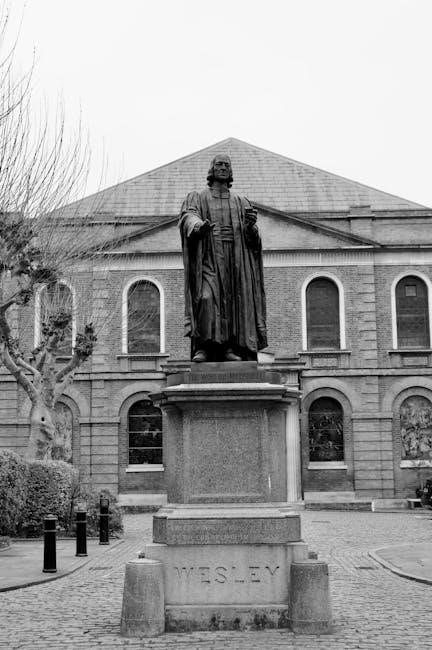The Book of Discipline is the official guide for the United Methodist Church, outlining governance, doctrine, and ministries․ It is available as a downloadable PDF for easy access․
Overview of the Book of Discipline
The Book of Discipline serves as the official guide for the United Methodist Church (UMC), detailing its governance, doctrine, and ministries․ It provides a comprehensive framework for church operations, including membership requirements, clergy standards, and disciplinary actions․ The book is regularly updated to reflect the evolving needs and values of the denomination․ Available in various formats, including a downloadable PDF, it ensures accessibility for clergy, laity, and scholars․ Key sections address church structure, worship practices, and social issues, making it an essential resource for understanding UMC policies and procedures․ The Book of Discipline plays a crucial role in maintaining unity and adherence to shared principles across the denomination․
The Mission of the United Methodist Church
The United Methodist Church is driven by its mission to make disciples of Jesus Christ for the transformation of the world․ Rooted in biblical teachings, the church emphasizes spiritual growth, compassion, and service․ It seeks to fulfill this mission through worship, education, and outreach, fostering a connection among believers globally․ The Book of Discipline outlines this mission, providing a framework for local churches to engage in ministries that address social justice, healthcare, and education․ By focusing on inclusivity and grace, the UMC strives to create communities where all people can experience God’s love․ Its commitment to this mission is reflected in its adaptive strategies and resources, including the downloadable PDF of the Book of Discipline, ensuring accessibility for all members․
Historical Background of the Book of Discipline
The Book of Discipline traces its origins to 1784, evolving from the Methodist Episcopal Church’s rules․ It has been updated regularly, with the 2016 and 2020 editions reflecting modern changes․ Available as a downloadable PDF, it remains a cornerstone of UMC governance and doctrine, guiding the church’s mission and practices historically․
Evolution of the Book of Discipline Over the Years
The Book of Discipline has undergone significant revisions since its inception in 1784, reflecting the evolving mission and challenges of the United Methodist Church․ Each edition updates policies, doctrines, and practices to align with societal changes and church needs․ The 2016 and 2020 editions introduced key updates, including disaffiliation processes and responses to debates on human sexuality․ These revisions aim to address contemporary issues while maintaining core values․ The Book remains a vital resource, now accessible as a downloadable PDF, ensuring its teachings are widely available to guide the church’s ongoing journey․ Its evolution underscores the UMC’s commitment to adapt while upholding its foundational principles․
Foundational Principles and Values
The Book of Discipline rooted in the United Methodist Church’s mission to make disciples of Jesus Christ, upholds core principles like grace, inclusivity, and social holiness․ It emphasizes the importance of a connectional church, where unity and shared governance guide decision-making․ The Book reflects Wesleyan theology, prioritizing personal and communal spiritual growth․ It also highlights the church’s commitment to justice, compassion, and mercy, urging members to engage in transformative ministry․ These values are central to the UMC’s identity and are reinforced through its polity and practices․ The Book of Discipline serves as a guide, ensuring these principles remain foundational to the church’s mission and witness in the world․

Key Sections of the Book of Discipline
The Book of Discipline outlines church governance, membership, clergy standards, and disaffiliation processes․ It includes foundational principles, mission statements, and procedural guidelines for United Methodist Church operations․
Church Structure and Governance
The Book of Discipline details the hierarchical structure of the United Methodist Church, emphasizing connectionalism․ It outlines the roles of General Conference, Annual Conferences, and local churches․
Bishops, clergy, and laity collaborate in decision-making processes․ The book also explains the administrative and judicial procedures, ensuring accountability and unity across the denomination․
This section provides clarity on how the church operates at all levels, from global governance to local congregation management․ It is essential for understanding the UMC’s organizational framework and operational guidelines․
The PDF version of the Book of Discipline offers easy access to these details, making it a vital resource for church leaders and members seeking to understand UMC governance and practices․
Membership Requirements and Responsibilities
Membership in the United Methodist Church involves professing faith in God and accepting Jesus Christ as Lord and Savior․ The Book of Discipline outlines that members must support the church through prayers, presence, gifts, and service․
Professing members are expected to participate in the life of the local church, including attending worship, engaging in ministries, and upholding the church’s teachings․ The PDF version of the Book of Discipline provides detailed guidance on these responsibilities․
It also emphasizes the importance of members fulfilling their vows, contributing to the church’s mission, and adhering to its doctrines․ This section is crucial for understanding the expectations and commitments of UMC membership, ensuring a strong foundation for individual and collective spiritual growth․
Standards for Clergy and Leadership
The Book of Discipline establishes clear standards for clergy and leadership within the United Methodist Church․ Clergy must meet specific educational and spiritual requirements, including certification and ordination processes․
The book emphasizes the importance of clergy leading a holy life, upholding the church’s doctrines, and fulfilling their roles with integrity․ It also addresses accountability measures, ensuring clergy adhere to ethical standards and church laws․
The PDF edition of the Book of Discipline provides detailed guidelines on clergy conduct, including prohibitions against self-avowed practicing homosexuals serving as clergy․ These standards aim to maintain the church’s mission and moral integrity while guiding leaders in their responsibilities to the congregation and the denomination․
The Disaffiliation Process in the Book of Discipline
Paragraph 2553 outlines the disaffiliation process, allowing churches to leave the UMC with property if approved by a two-thirds congregational vote, reflecting current conflicts within the denomination․
Paragraph 2553 and Its Implications
Paragraph 2553 of the Book of Discipline provides a formal pathway for churches to disaffiliate from the UMC while retaining their property, requiring a two-thirds majority vote․ This provision reflects the deep divisions within the denomination, particularly over issues like human sexuality․ By enabling churches to leave amicably, it seeks to maintain unity among remaining congregations․ However, its implementation has sparked debates about the future of the UMC and its theological identity․ The implications are far-reaching, as it addresses property rights and doctrinal alignment, while also highlighting the broader challenges of maintaining a unified church amidst differing beliefs and practices․ This paragraph has become a focal point in discussions about the UMC’s future and its ability to navigate internal conflicts effectively․
Procedures for Church Disaffiliation
The disaffiliation process outlined in the Book of Discipline requires churches to follow specific steps to formally separate from the UMC․ A two-thirds majority vote by the church conference is mandatory, ensuring broad congregational support․ The process involves approval from the Annual Conference and adherence to financial and property obligations․ Churches must also secure approval from their district and annual conferences․ Once all requirements are met, the disaffiliation is finalized, allowing the church to retain its property while separating from the UMC․ This structured approach aims to balance amicable separation with the denomination’s need to maintain its integrity and doctrine․ The procedures reflect the UMC’s efforts to navigate internal divisions while preserving its core values and governance framework․

The Role of the Book of Discipline in Church Governance
The Book of Discipline serves as the official guide for the United Methodist Church, providing governance, doctrine, and operational standards; Available as a downloadable PDF, it ensures compliance with church laws and maintains cohesion across the denomination, guiding its ministries and core values effectively․
Authority and Compliance
The Book of Discipline is the foundational document of the United Methodist Church, serving as the ultimate authority for church governance and ethical standards․ It outlines the laws, doctrines, and operational guidelines that ensure compliance across the denomination․ By adhering to its principles, members and leaders maintain unity and integrity in their practices․ The document addresses critical issues such as human sexuality, clergy standards, and disaffiliation processes, ensuring accountability at all levels of church leadership․ Its availability in PDF format makes it accessible to all members, fostering transparency and adherence to the church’s mission and values․ Compliance with the Book of Discipline is essential for upholding the church’s identity and fulfilling its purpose effectively․
Relevance in Modern Church Practices
The Book of Discipline remains a vital resource for modern United Methodist Church practices, offering guidance on contemporary issues․ Its digital availability, such as the PDF edition, ensures accessibility for members and leaders in today’s tech-driven world․ The document addresses current debates, including human sexuality and inclusivity, providing a framework for navigating these complexities․ It also outlines procedures for disaffiliation, reflecting the evolving needs of congregations․ By adhering to its principles, the church maintains its mission while adapting to societal changes․ The Book of Discipline continues to shape the UMC’s identity, ensuring relevance and unity amidst modern challenges․ Its guidelines for clergy conduct and church governance remain essential for fostering a cohesive and purpose-driven congregation․

Challenges and Controversies Surrounding the Book of Discipline
The Book of Discipline faces debates over human sexuality and inclusivity, with some viewing its teachings as outdated․ Disaffiliation processes, like Paragraph 2553, also spark tension․
Debates on Human Sexuality and Inclusivity
The Book of Discipline has sparked significant debates, particularly regarding its stance on human sexuality․ It states that “homosexuality is incompatible with Christian teaching,” a position that has led to widespread controversy․ This doctrine prohibits self-avowed homosexuals from becoming clergy and restricts same-sex marriages within the church․ Critics argue that these policies are exclusionary and contradict the church’s mission of inclusivity․ The debates have intensified as some congregations and leaders advocate for a more progressive approach, while others uphold traditional interpretations․ These tensions have contributed to disaffiliation efforts, with Paragraph 2553 providing a pathway for churches to leave the denomination over such disagreements․ The issue remains a central challenge, reflecting broader societal divides on human sexuality and religious doctrine․
Accountability and Enforcement of Church Laws
The Book of Discipline emphasizes accountability within the United Methodist Church, outlining clear guidelines for clergy and members․ It establishes standards for ethical conduct, financial transparency, and adherence to doctrine․ Challenges arise in enforcing these laws, particularly regarding contentious issues like human sexuality․ Some critics argue that enforcement is inconsistent, leading to division and mistrust․ Paragraph 2553, for instance, has been a focal point in disaffiliation debates, as churches seek to align with or depart from these standards․ The Book of Discipline serves as both a unifying and dividing force, reflecting the tension between maintaining traditional doctrine and addressing modern societal changes․ Its enforcement continues to shape the church’s identity and governance․

Digital Access to the Book of Discipline
The United Methodist Church offers digital access to the Book of Discipline through a downloadable PDF edition, available on platforms like Cokesbury, ensuring easy and convenient access for members and clergy․
Availability of the PDF Edition
The Book of Discipline is widely available in a downloadable PDF format, ensuring accessibility for clergy, members, and researchers․ The 2020/2024 edition can be downloaded from platforms like Cokesbury, the official retail arm of the United Methodist Publishing House․ This digital version offers convenience, enabling users to access the document on various devices․ The PDF format preserves the layout and content integrity, making it ideal for reference and study․ Additionally, the PDF edition is often available for free or at a reduced cost compared to print versions, promoting inclusivity and ease of access․ This digital accessibility reflects the church’s commitment to adapting to modern needs while maintaining the integrity of its governing principles․ The PDF edition is also searchable, enhancing usability for those seeking specific information quickly․
Online Resources and Sales Platforms
The Book of Discipline in PDF format is readily available through official online platforms, such as Cokesbury, the retail arm of the United Methodist Publishing House․ Cokesbury offers multiple editions, including the 2020/2024 version, in formats like hardback, bonded leather, and digital downloads․ Additionally, the Iowa Annual Conference website provides free access to the downloadable PDF, ensuring widespread accessibility․ These platforms cater to both individual and institutional needs, making it easy for clergy, laity, and scholars to obtain the document․ The online availability reflects the church’s adaptability to modern technology, ensuring that its governing principles remain accessible to all․ This convenience underscores the UMC’s commitment to transparency and inclusivity in its governance and practices; The digital versions are also searchable, enhancing usability for quick reference․
The Book of Discipline remains a vital resource for guiding the United Methodist Church, available as a downloadable PDF for easy access to its governance and doctrine․
The Significance of the Book of Discipline in the UMC
The Book of Discipline is a foundational document for the United Methodist Church, serving as a comprehensive guide to its governance, doctrine, and ministries․ It outlines the church’s mission, structure, and ethical standards, ensuring unity and accountability across its global connection․ The book addresses key issues such as human sexuality, clergy standards, and disaffiliation processes, reflecting the church’s evolving values and challenges․ Its availability in PDF format ensures accessibility for members and leaders, facilitating understanding and compliance with church laws․ As a central resource, it shapes the UMC’s identity and practices, providing a shared framework for decision-making and discipleship․
By adhering to the Book of Discipline, the UMC upholds its commitment to social holiness and spiritual growth, guiding its members toward faithful living and service․
Future Prospects and Potential Reforms
The Book of Discipline faces evolving challenges as the UMC navigates internal divisions and societal changes․ Debates over human sexuality and inclusivity may lead to reforms, potentially reshaping the church’s stance on LGBTQ+ issues․ The disaffiliation process, outlined in Paragraph 2553, is likely to remain a focal point, influencing the structure and unity of the denomination․ Digital accessibility, such as the PDF edition, ensures the document remains relevant in a modern context․ Future reforms could balance tradition with progressive values, fostering unity while addressing diverse perspectives․ The UMC’s ability to adapt its governance and doctrines will be crucial in maintaining its mission and relevance in a changing world․





